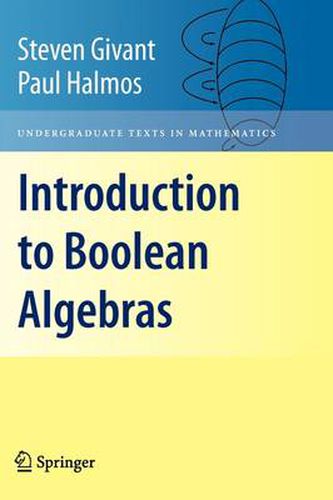Readings Newsletter
Become a Readings Member to make your shopping experience even easier.
Sign in or sign up for free!
You’re not far away from qualifying for FREE standard shipping within Australia
You’ve qualified for FREE standard shipping within Australia
The cart is loading…






This title is printed to order. This book may have been self-published. If so, we cannot guarantee the quality of the content. In the main most books will have gone through the editing process however some may not. We therefore suggest that you be aware of this before ordering this book. If in doubt check either the author or publisher’s details as we are unable to accept any returns unless they are faulty. Please contact us if you have any questions.
The theory of Boolean algebras was created in 1847 by the English mat- matician George Boole. He conceived it as a calculus (or arithmetic) suitable for a mathematical analysis of logic. The form of his calculus was rather di?erent from the modern version, which came into being during the - riod 1864-1895 through the contributions of William Stanley Jevons, Aug- tus De Morgan, Charles Sanders Peirce, and Ernst Schr. oder. A foundation of the calculus as an abstract algebraic discipline, axiomatized by a set of equations, and admitting many di?erent interpretations, was carried out by Edward Huntington in 1904. Only with the work of Marshall Stone and Alfred Tarski in the 1930s, however, did Boolean algebra free itself completely from the bonds of logic and become a modern mathematical discipline, with deep theorems and - portantconnections toseveral otherbranchesofmathematics, includingal- bra,analysis, logic, measuretheory, probability andstatistics, settheory, and topology. For instance, in logic, beyond its close connection to propositional logic, Boolean algebra has found applications in such diverse areas as the proof of the completeness theorem for ?rst-order logic, the proof of the Lo ‘ s conjecture for countable ? rst-order theories categorical in power, and proofs of the independence of the axiom of choice and the continuum hypothesis ? in set theory. In analysis, Stone’s discoveries of the Stone-Cech compac- ?cation and the Stone-Weierstrass approximation theorem were intimately connected to his study of Boolean algebras.
$9.00 standard shipping within Australia
FREE standard shipping within Australia for orders over $100.00
Express & International shipping calculated at checkout
This title is printed to order. This book may have been self-published. If so, we cannot guarantee the quality of the content. In the main most books will have gone through the editing process however some may not. We therefore suggest that you be aware of this before ordering this book. If in doubt check either the author or publisher’s details as we are unable to accept any returns unless they are faulty. Please contact us if you have any questions.
The theory of Boolean algebras was created in 1847 by the English mat- matician George Boole. He conceived it as a calculus (or arithmetic) suitable for a mathematical analysis of logic. The form of his calculus was rather di?erent from the modern version, which came into being during the - riod 1864-1895 through the contributions of William Stanley Jevons, Aug- tus De Morgan, Charles Sanders Peirce, and Ernst Schr. oder. A foundation of the calculus as an abstract algebraic discipline, axiomatized by a set of equations, and admitting many di?erent interpretations, was carried out by Edward Huntington in 1904. Only with the work of Marshall Stone and Alfred Tarski in the 1930s, however, did Boolean algebra free itself completely from the bonds of logic and become a modern mathematical discipline, with deep theorems and - portantconnections toseveral otherbranchesofmathematics, includingal- bra,analysis, logic, measuretheory, probability andstatistics, settheory, and topology. For instance, in logic, beyond its close connection to propositional logic, Boolean algebra has found applications in such diverse areas as the proof of the completeness theorem for ?rst-order logic, the proof of the Lo ‘ s conjecture for countable ? rst-order theories categorical in power, and proofs of the independence of the axiom of choice and the continuum hypothesis ? in set theory. In analysis, Stone’s discoveries of the Stone-Cech compac- ?cation and the Stone-Weierstrass approximation theorem were intimately connected to his study of Boolean algebras.